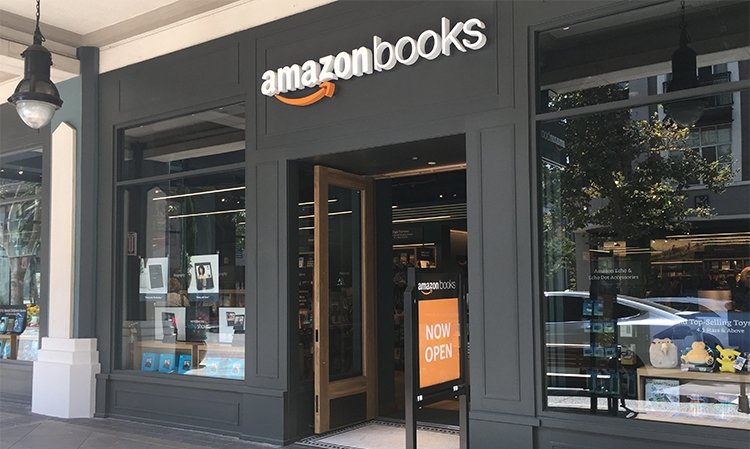Amazon closing all of its brick-and-mortar bookstores and '4-Star' locations
Amazon said it plans to shutter all of its physical bookstores, as well as pop-up shops and other brick-and-mortar retail locations in the U.S and U.K.

Amazon Books
In total, Amazon will close 68 stores in the U.S. and U.K. The exact closure dates will vary by location and Amazon will notify customers of the dates via signage at the locations.
Amazon said it would help workers at the retail stores find other roles at the company. Workers who don't want to stay will be offered severance packages.
According to Reuters, which first reported the news, the closures will mark the end of one of Amazon's "longest-running retail experiments."
Since opening its first brick-and-mortar bookshop in 2015, Amazon has tried its hand at a variety of retail ventures, including cashier-less convenience stores and "4-star" stores that sell goods with high customer ratings on Amazon's online platform.
It always brought an online touch to the physical realm, however. Its retail locations, for example, pulled reviews from Amazon's online storefront and used sales data to determine what people were reading.
Despite the shuttering of 4-star, pop-up, and bookstore locations, Amazon isn't abandoning physical retail entirely.
Reuters reports that the company recently announced plans to open a brick-and-mortar fashion store that leverages algorithms to suggest to customers what they should try on. In February, Amazon also opened its first Whole Foods that let users check out without scanning items.
Read on AppleInsider

Amazon Books
In total, Amazon will close 68 stores in the U.S. and U.K. The exact closure dates will vary by location and Amazon will notify customers of the dates via signage at the locations.
Amazon said it would help workers at the retail stores find other roles at the company. Workers who don't want to stay will be offered severance packages.
According to Reuters, which first reported the news, the closures will mark the end of one of Amazon's "longest-running retail experiments."
Since opening its first brick-and-mortar bookshop in 2015, Amazon has tried its hand at a variety of retail ventures, including cashier-less convenience stores and "4-star" stores that sell goods with high customer ratings on Amazon's online platform.
It always brought an online touch to the physical realm, however. Its retail locations, for example, pulled reviews from Amazon's online storefront and used sales data to determine what people were reading.
Despite the shuttering of 4-star, pop-up, and bookstore locations, Amazon isn't abandoning physical retail entirely.
Reuters reports that the company recently announced plans to open a brick-and-mortar fashion store that leverages algorithms to suggest to customers what they should try on. In February, Amazon also opened its first Whole Foods that let users check out without scanning items.
Read on AppleInsider

Comments
I guess people get wrapped up in impulse buys enough to spend that kind of money. Me? I'll buy the used copy for $8 and save a bundle... As for returns, fortunately there's a UPS store a few doors down from the Amazon store.
Yeah, no. A vast majority of PC computers and Android phones are cheap pieces of crap that are mainly used for getting on FaceBook and watching YouTube videos. I think very few of them are used for anything that could make them be considered “tools”. I think what you meant to say, is that most PC owners don’t care how those devices work and are not loyal to any particular brand. Most don’t know there’s a difference between macOS and Windows… a “computer” is a computer.
There’s no “cult” to Apple… The fact is, only Apple makes Apple products. The only viable alternative to products hawked by all their competitors, who all only make Windows or Android products. And their stores have been successful because they took a novel approach by concentrating on customer support and services in what is considered to be mainly commodity markets where profits are thin and “customer service” is relegated to a phone tree.
Amazon are a commodity store. They don't make much themselves, and the things that they do make are mostly generic. They don't really compare.
It need not be a cult. It just has to be high quality and not interchangeable. Apple's gear is high quality and not interchangeable with third party brands. Nobody window shops the Apple Store and then goes elsewhere to buy something that's the same, but cheaper. Store staff are generally well trained to be helpful and aren't motivated to be pushy to earn commissions. Unlike most other tech retail, you can go in, look at stuff, get questions answered or be left alone to fiddle with it on your own. You can buy something or not, no problem.
'Genius Bar' tech support is also well trained, usually helpful, and in a huge cultural break from most other tech support, almost never condescending or indecipherable to customers. I'm almost certain that considerable training is devoted to simply sorting out what the customer's level of technical understanding is, and meeting them at that level. Non-tech people don't feel talked down to, and more sophisticated customers don't have to spin their wheels being repeatedly asked if their device is plugged in or turned on.
The difference isn't that a visit to the Apple Store is some sort of religious experience. It's that it isn't wrapped up in a sense of dread or loathing.